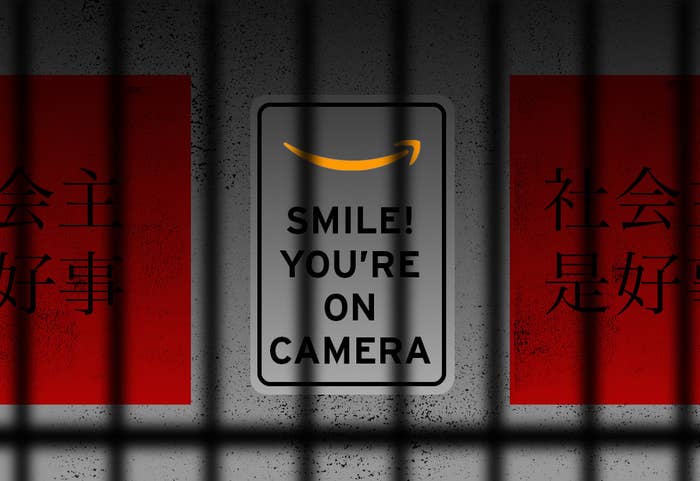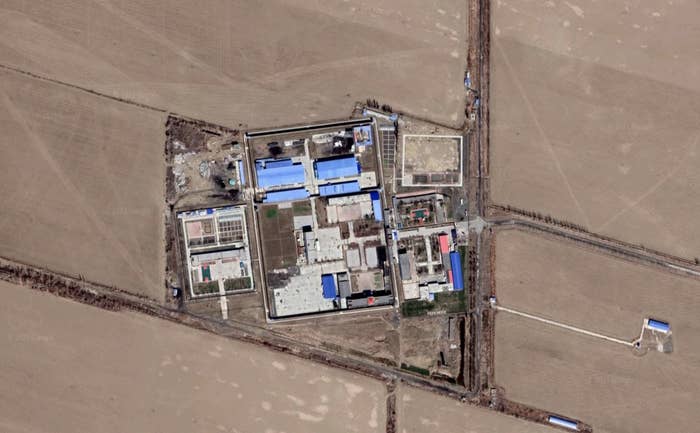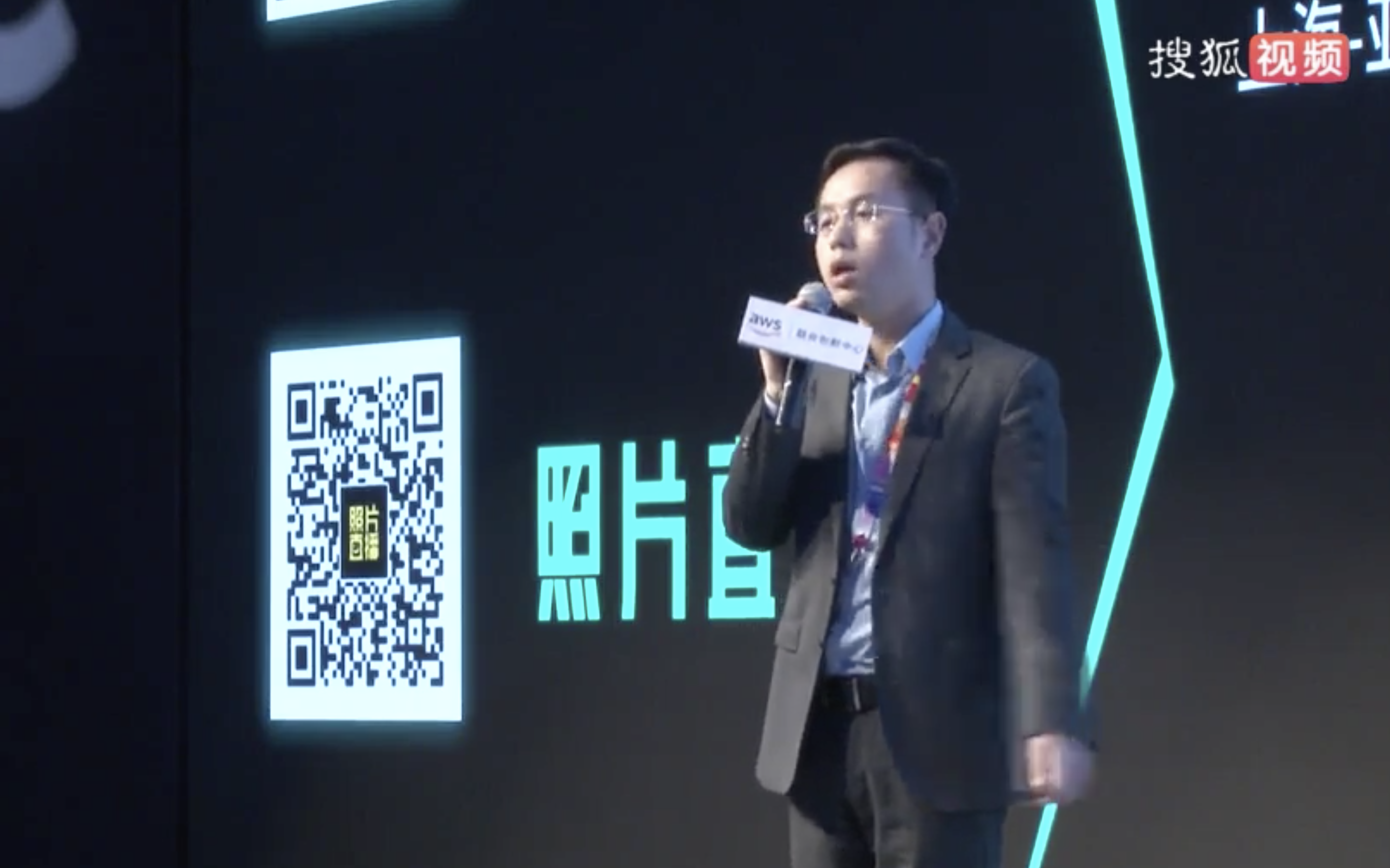
With an Amazon logo behind him and luminaries from Shanghai’s booming venture capital scene in front of him, the executive onstage delivered his pitch. His company, Renwei Electronics, helps authorities in China track prisoners and detainees — alerting guards to their movements and even fitting them with heart rate monitors.
Renwei deploys its “smart prison” system in China’s Xinjiang region, where more than 1 million Muslim minorities have been locked up.
Yet this did not interfere with the warm welcome for Renwei at an event cohosted by an Amazon-backed “joint innovation center” in November. Event organizers gave Renwei’s executive a platform to deliver an “investor road show”–style speech to some of China’s most prestigious investors. And Renwei received a “product innovation award” recognizing it as one of six “outstanding entrepreneurial companies.”
Sent a detailed list of questions, Amazon declined to comment on the record. Renwei did not respond to a request for comment.
A growing list of multinational corporations are under pressure to move their supply chains away from Xinjiang, amid mounting evidence of mass detention and forced labor there, as part of what the US and other countries have recently called a genocide. Congress is considering a bill banning imports from Xinjiang tainted by forced labor, and US customs have already banned products made from tomatoes and cotton in the region, among other goods.
Amazon shut down its e-commerce business in China in 2019, but other parts of its sprawling empire still work with Chinese customers, including its highly profitable cloud computing subsidiary, Amazon Web Services.
AWS runs the joint innovation center with local Shanghai government and business organizations. The center boosts startups by providing them with AWS cloud resources and tech support, and by helping them acquire talent and comply with government regulations, according to an ad for the event. It’s unclear what benefits, if any, that Renwei and other companies that won awards received. The center’s website emphasizes that the companies it supports also benefit from Amazon’s resources and reputation.
Horizon Advisory, a Washington, DC–based geopolitical advisory firm, first made note of Renwei’s award and the Amazon event in research it shared with BuzzFeed News.
Renwei’s technology has been used in prisons across China, including at Zhongjiazhuang Prison, located near the city of Shihezi. The prison is administered by the powerful Xinjiang Production and Construction Corps, a paramilitary and governmental organization that the US placed sanctions on last year, citing its ties to human rights abuses in the region.

BuzzFeed News located the prison in Xinjiang’s Shawan County using satellite imagery. An official photo of the prison posted in 2016 shows a rounded front gate in elaborate ironwork and a lion statue to the left of the entrance. Behind the gate, a road leads up to a two- to three-story building. A white wall and a row of trees run along the road. A Google Earth image shows the gate’s shadow cast on the ground, a light-colored object about 2.5 meters high that appears to match the lion statue, and the same east-west wall and line of trees. The roof of the building in the background also matches the photograph.
The Chinese government has forced upwards of a million Muslim minorities, including Uyghurs, Kazakhs, Hui Muslims, and others into mass internment camps in the past four years. A BuzzFeed News investigation last year found the government had dramatically escalated its campaign since 2017, building hundreds of new compounds bearing the hallmarks of internment camps and prisons. Dozens of people formerly detained there described abuse, deprivation, and routine humiliation inside, ranging from overcrowding and food deprivation to beatings and even torture. The government says the internment camp system is for “transformation through education,” and deradicalizing extremists.
Government data analyzed by the New York Times shows that Xinjiang’s prison population has also ballooned during this time — the region accounted for 21% of the country’s total arrests for just 2% of the population in 2017. Muslim minorities make up about half of Xinjiang’s population. China’s Communist Party–controlled courts convict more than 99% of defendants, according to government data.
Prisons in many parts of the world, including the United States, use data-driven systems to monitor and control prisoners. But in Xinjiang, the government’s campaign specifically targets ethnic minorities by detaining them over religious practices, connections to family abroad, or other behavior seen as suspect or threatening to the state.
Renwei describes its system as “an important platform for digital prisons to improve their management capabilities through information technology.” It uses image processing, data encryption, cloud computing, and “big data” to set up a “personnel positioning system” that can be monitored remotely, the company says. The data is funneled into a centralized platform that authorities can use for “management decision-making.”
Renwei says that this improves efficiency, and helps prison staff “achieve new ideas of preemptive prevention, mid-incident control and post-incident verification.” An early warning system signals when police are attacked, Renwei says, and when detainees enter areas forbidden to them. Prisoners can be fitted with electronic devices that monitor their heart rates and other vital signs to “reduce the risk to law enforcement.” The system helps prevent people from escaping or killing themselves, Renwei says.
High-tech surveillance is a hallmark of life in Xinjiang’s camps and prisons. More than two dozen people formerly detained there have told BuzzFeed News that they were monitored in real time by cameras that were placed in the corners of their cells and even in the bathrooms. Guards could punish them for tiny infractions, like speaking their native language instead of Mandarin Chinese.
Renwei has also received recognition from China’s domestic security service, the Ministry of Public Security. The company featured at a ministry promotional conference attended by the department’s vice minister and other government officials.

In addition to Shanghai venture capitalists, the audience at the Nov. 16, 2020 Amazon event included executives from multinational giants such as Siemens and Kone Elevators, according to a press release about the event.
Onstage, the Renwei executive spent about 11 minutes flipping through a PowerPoint presentation that walked through each aspect of the business, noting that the system could be used not only in prisons, but also in detention centers. At the end, he looked toward the investors and asked for their questions. ●
Correction: An earlier version of this post incorrectly stated that the Renwei executive onstage thanked the Shanghai-Amazon Joint Innovation Center for its support.

